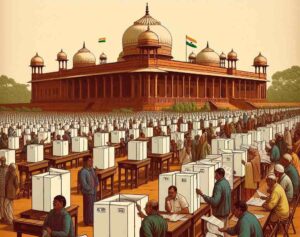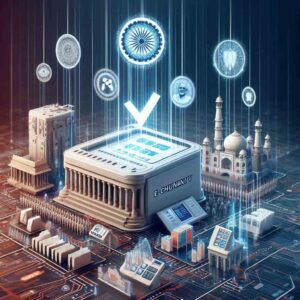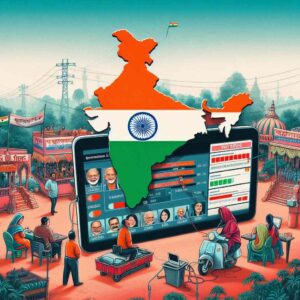e-Chunav 2024 Revolutionizing Indian Elections with Digital Voting
Introduction
-
Definition of e-Chunav (electronic voting):
An e-Chunav or electronic voting in the Indian context refers to the application of electronic systems and technologies during voting and vote-counting electoral processes. Instead of the normal paper-based voting processes, it aims to automate the voting process by replacing analogous processes with digital ones that can enhance efficiency, streamline voting and improve accessibility for voters.

-
Importance and relevance in the context of Indian General Elections 2024:
With a few days left for 2024 General Elections in India, e-Chunav has huge implications. This actually equals modernizing of the election cycles comprising of the measures of the country’s technological advancement and inclusion of more streamlined digital governance. Moreover e-Chunav itself can meet the enduring problems like voter fraud, queues during voting in polling stations, and logistics problems for places far away.
-
Overview
This blog will dive into what a e-Chunav is in the Indian General Elections 2024 and how it is implemented, why we need it, what challenges exist in bringing it on board, brainstorming on how best to ensure proper implementation, the public reactions experienced, and the future of e-Chunav.
Background of Indian General Elections
-
Brief history of Indian elections:
India is a country with armed with democratic practices as witnessed when the first election was held in 1951-52 after the country embrained independence from the rule of Britain. Now elections have been authorizing every 5 years to elect members of the Lok Sabha, the lower house of the parliament, besides the members of state legislative assembly.
-
Traditional voting methods and their limitations:
For ages, the Indian elections have been mainly dealt with the manual voting which consisted of ballot papers for the people and the ballot boxes for their collection on the election day. Even though the ESA has been the nation’s democratic pillar for decades, it is not with no flaws – namely long queues at polling stations, logistical problems endemic in rural areas, and electoral fraud and irregularities issues.

-
Need for innovation in the electoral process:
Recognizing the need that the election process be modernized and the shortcomings it have, there has also been a growing cry out for technological adaptation in Indian electoral system. e-Chunav can be consider as the most appropriate solution that can smoothen the voting process, increase transparency, and make sure that elections are not tampered with..
What is e-Chunav?
-
Definition and explanation of electronic voting:
e-Chunav means voting through electronic systems such as computer, printing machine etc. for casting or counting the votes in election. Pundits no more will make dots with pen on paper tables. Electronic devices will be used instead. Voters can record their votes digitally using touchscreens or electronic keypads.
-
How e-Chunav works:
In e-Chunav the voter receives an electronic voting machine/ other electronic device with voting in as software. They choose their dream candidates and parties virtually. Then, the votes of the voters are registered electronically. These votes are after that encrypted and forwarded to a decentralized ledger and simultaneously secured and safeguarded for counting and tabulation

-
Key features and benefits:
The key features and benefits of e-Chunav include:
– Streamlining the voting process: E-Chunav as an election system improves the lessening of the time required for casting and counting of votes which in turn can speed up the election outcome.
– Enhancing efficiency and accuracy: Digital voting lowers the risk of inaccurate counts and adding up of the votes.
– Improving accessibility for voters: The electronic voting systems employs systems that ensures that even voters with disabilities and diversity of populations are accommodated and persons whose first language is not the national language can as well interfere with the process
– Strengthening the security and integrity of the electoral process: e-chunaw involves encrypted and authentification processes that can prevent tampering and robbery

Advantages of e-Chunav
-
Streamlining the voting process:
e-Chunav relocates the paper ballot and manual tabulation, aims at cutting down the time and resources that is utilized to conduct elections. The cumulation of these simplifications allows faster receiving of election outcome as well as overall efficiency of the election processing.
-
Enhancing efficiency and accuracy:
Through automating both the voting process and ballot counting, e-Chunav reduces mistakes and inaccurate occurrences associated with the manual tally. This will, however, ensure that election results are more accurate and arguments against the result are therefore dismissed.
-
Improving accessibility for voters:
Modern electronic voting systems are developed using such features so that large numbers of voters from various backgrounds are able to participate. A feature that makes voting even more interesting is the audio system that is used when submitting your ballot, the Braille interface that is put in place and the option of using whatever language that you are comfortable using, brings more people to the polls..
-
Strengthening the security and integrity of the electoral process:
e-Chunav seeks to sustain the entire election process, and this includes registering secure means of voting and preventing any possibility of manipulation or altering the election results. A lot of times, encryption, authentication and audit trails are used in order to securely send and store voted preventing from any breach and giving people an assurance of the integrity of the electoral system
 .
.
Challenges and Concerns
-
Digital divide: Ensuring equitable access to technology:
A major obstacle to an e-Chunav is the digital gap and advancing that the voting electronic can be done by every citizen that has the technology to realize the digital gap. Differences regarding internet connection and technical skills in a digital world blueprint ways to unequal involvement in the election process.
-
Cybersecurity risks and vulnerabilities:
E-voting systems approval raises diverse cybersecurity issues like hacking, malware, etc. that may facilitate data infiltration. Guarantee of the cybersecurity of the electronic voting systems implies strong security measures, audits at regular times and real-time detection and mitigation of risks.
-
Public trust and confidence in electronic voting systems:
Convincing people towards this digital application is crucial ingredient in this digital application. As security, reliability and transparency of electronic voting systems are still questionable, the authorities are needed to make them transparent, accountable and raise public awareness.
-
Regulatory and legal considerations:
The issue of e-Chunav is teachers is that of not being able to update the existing electoral laws and regulations properly to conform to the electronic voting systems. Legislation that covers the use of electronic voting, data protection, rights of privacy, and cybersecurity needs to be developed to guarantee online votes and local government elections are legal and legitimate.
Implementation of e-Chunav in the 2024 General Elections
-
Pilot projects and trials leading up to the elections:
Before the actual general elections of 2024, pilots and tests/trials of e-Chunav can be conducted that will help in appraising the applicability and usefulness of electronic voting systems. The pilot projects are for extracting the most crucial lessons and feedback which later helps in the successful execution of e-Chunav more extensively on a greater scale.
-
Infrastructure and technology requirements:
The setting up of e-Chunav requires information facility and hardware, including the electronic voting machines (EVMs), voter registration databases, dependable list communication networks, and electric power backup. A major asset in an electronic voting system is the acquisition of the technology infrastructure and capacity building.
-
Training for election officials and voters:
Instructing the job duty of elections officials and workers relative to the operation and maintenance of the electronic voting system should be in the priority list along with procedures about the security and the integrity of the election process. A voter education campaign and the voter outreach campaigns should be in place to equip the citizenry with the mode contemporary electronic voting and calm their concerns and wrong perceptions as well..
-
Public awareness campaigns and outreach efforts:
Public Awareness campaigns are not just about telling people about the benefits and how to use the system. They are also about identifying any issues and taking care of them. Community-based initiatives is aimed at remote areas, people living in the neighborhood, and taking into account special groups of the electorate. It is primarily done for the purpose of encompassing the most participation, the widest perspective, and the most inclusive electoral process possible.

Public Opinion and Feedback
-
Surveys and studies on voter perceptions of e-Chunav:
Anomalous and colonial research is a strategy that can assist in assessing public opinion pertaining to e-Chunav, containing the public’s attitude toward electronic voting, the persuasion of ease use of electronic voting systems, and how they want to vote..
-
Concerns and reservations expressed by stakeholders:
The parties, civil society bodies and monitoring groups may have their worries and concerns about the way e-Chunav will be implemented and can issues flagged. These issues that might be raised could be for example the security and transparency of the voting system, accessibility, as well as bias which can be introduced through electronic voting systems
-
Strategies for addressing feedback and building trust:
Ensuring that stakeholder’s feedback and viewed feelings and opinions are addressed must be considered a priority for advancing e-Chunav’s credibility and reputation. Transparency, accountability, and the partnership with stakeholders through communication, consultation and the involvement in the dialogue are the main strategies which will ensure the proper action in accordance with the electoral process.
Also read :- MOUNT KAILASH AND LAKE MANASAROVAR
Future Prospects and Considerations
-
Potential for nationwide adoption of e-Chunav:
Coupled with the success of e-Chunav in 2024 General Elections, the adoption of this new technology in nationwide elections is likely to be the next phase of general elections in the country. Electronic voting systems are being successfully scaled up and are highly replicable in expanding their efficacy in terms of efficiency, accessibility, and the integrity of the elections nationwide.
-
Continuous improvement and innovation in electronic voting technology:
The realm of e-voting technology is always getting sharper, with enhancements in the areas of hardware, software, and security. Sustained progress in the development of e-voting systems necessitates the rising of new challenges and, as a result, the continuous increase of usability and the accessibility features and the preservation of public confidence in the electoral process of all times..
-
Role of e-Chunav in shaping the future of Indian democracy:
The e-Chunav has the ability to mold Indian democracy to the future, as it encourages more and more involved people, generate the awareness of inclusivity and transparency by which the democracy is operated. Through technology-enabled building of a more resilient, efficient and accountable democratic structure, India can create a paradigm that empowers the people while ensuring the realization of desirable citizen ideals.

Also read :- ARTIFICIAL INTELLIGENCE IN 2024 ELECTIONS
Conclusion
-
Recap of key points discussed in the blog:
In this post, we can say that e-Chunav is the upcoming election process concerning a virtual way of parliament in Indian country in 2024, discuss its definition, advantages, challenges, implementation strategies, public opinion, and further prospects..
-
Final thoughts on the significance of e-Chunav in the Indian General Elections 2024:
Dealing with e-Chunav is one of the greatest stages in the context of the e-governance because good election in the country depends much on the results of democracy. By leveraging on technology, we will open up a new door where each voice will be respected and all votes registered..
-
Call to action – engage with the topic and share your views:
How do you feel about e – Chunav? Be sure to make your thoughts and observation in the comment box. Your opinion is a blessing in creating a conversation and moving forward with the positive change we see in the election process.
Nice information